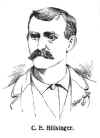|
them (sic) danced with the scalps tied in their hair, with the blood still dripping from them. During their stay Brigg's traded themcoffee and tobacco for 60 tanned buffalo robes.
Hillsinger was so much interested in the war dance that he forgot to offer them any sorghum.
The following night the Pawnees stole all of Briggs' stock except one Spanish mule. He and three men followed on foot leaving Mrs. Briggs and one man, Cal Hopkins, in camp; they caught up with the Indians at Cedar Bluffs but had to pay $2.50 a head for their stock to get them back.
The Pawnees were taken at great disadvantage, they being taken by surprise and having 1000 squaws and papooses with them, while the Sioux had nothing but warriors.
Hillsinger took a lariat rope and a whetstone from a dead Indian which he kept for many years as a memento of that memorable trip.
Upon their arrival at Norton he purchased what supplies Briggs had left and sold them out to the settlers.
Briggs returned to the reservation, closed up his business affairs, returned to Norton and became a permanent resident in 1873.

Chas. Hillsinger married Miss Lou Morris, a beautiful and accomplished lady who resided with her parents near Almena.
They now have a large and bright family, an agreeable and comfortable home supplied with all the necessaries of life.
Between farming and stock raising he has accumulated a competency for his declining years, and is considered one of our most substantial citizens.
Mott Wood lived here for several years he never married, worked by the month most of the time, saved all his money and is reputed to be well fixed financially.
He now resides in Colorado.
Thomas Brown brought his family to Norton county in February 1873. His son Frank took a claim adjoining his father, he afterward married Miss Mary High, and now lives on the farm of Thos. Burton two miles north of Norton.
His eldest daughter, Mary, married Chester Posson who moved in 1885 to Holt county, Nebraska, where they now reside.
Old Tom, as he was familiarly called lived here for many years. He took an active part in social enjoyments of the early settlers; his Irish wit furnished amusement around the camp fire and dugouts of the early bachelor settlers.
Many of his stories are remembered and often repeated up to the present time.
He now resides at Stafford, Holt county, Nebraska.
Marsh and Oliver took a more active part in the political and material growth of Norton and will be referred to again.
In the fall of 1871, in Brown county, Kansas, J. H. Simmons and W. E Case became acquainted.
Simmons was teaching school and Case was working on a farm. They each had one pony as their total stock in wealth.
In March of 1872 they put their effects together, bought a wagon and harness and started.
They had read a glowing description in a Chicago paper of the Prairie Dog valley, and especially that portion of it Iying in Norton county, written by one of a party of hunters who spoke in highest praise of the richness of soil, purity of water, healthfulness of climate and abundance of buffalo and other wild game; to Norton they hied.
The only incident worthy of mention was that they purchased fifty dozen of eggs to bring with them, expecting to sell them at a high price.
After they had been on the road nine days and had arrived at Jewell City, their eggs were all gone.
They had eaten them all. They arrived at Coleman's, east of Almena, April 2, came on to where Norton now stands Coleman accompaning [sic] them.
On the 5th Simmons settled on land now owned by
|